Covid-19 66
Ralph Gonsalves Wins Fifth Term

Ralph Gonsalves Wins Fifth Election in St. Vincent and the Grenadines
By Caribe, Elections, Ralph Gonsalves, Saint Vincent and the Grenadines
November 6, 2020
Translated and edited by Walter Lippmann for CubaNews.
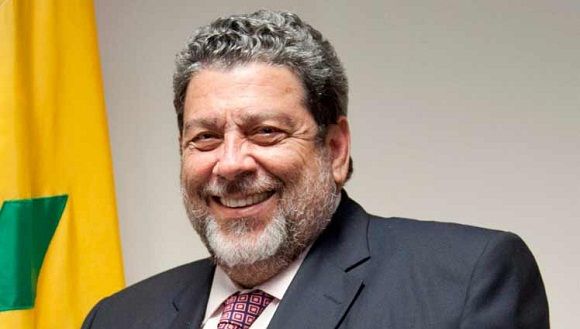
The Prime Minister of St. Vincent and the Grenadines, Ralph Gonsalves
The citizens of St. Vincent and the Grenadines elected Prime Minister Ralph Gonsalves to a fifth consecutive term in Thursday’s general elections, according to preliminary figures released in Kingstown, the capital.
According to these figures, the United Labor Party (ULP) achieved a major victory by winning nine of the 15 seats in Parliament, compared to the eight it controlled until now.
Godwin Friday’s opposition New Democratic Party (NDP) lost one seat and took the remaining six.
In declaring himself the winner in the elections, Gonsalves affirmed that the population adopted “our progressive agenda for the future” and rejected “the policy of hate, backwardness and colonialism.
He also stressed the need for the unity of the country to address the challenges of development.
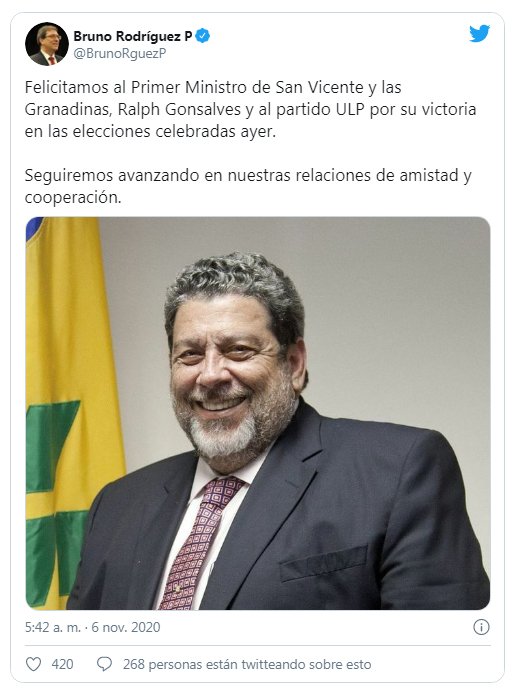
For the elections, this regional body sent a group of six observers, led by Anthonyson King, a member of the electoral commission of Antigua and Barbuda.
Voter registration for the election was 89,119 persons over the age of 18 out of a total population of 110,000.
Those subject to quarantine because of COVID-19 were also able to cast their vote. The consultation took place under a pandemic prevention protocol.
The country is one of the few in the world that has not recorded any deaths from the disease and only 75 cases, 70 of them recovered, since the beginning of the health crisis in March, while CARICOM as a whole reports some 45,000 confirmed cases and just over 1,000 deaths.
St. Vincent and the Grenadines is among the 10 smallest countries in the world and this month it holds the presidency of the United Nations Security Council, a position it holds from last January until December 2021.
Cuban Foreign Minister Bruno Rodriguez today congratulated St. Vincent and the Grenadines Prime Minister Ralph Gonsalves and the United Labor Party (ULP) on their election victory.
In his Twitter account, the Foreign Minister highlighted the relations of friendship and cooperation between both nations, on which he expressed the will to continue advancing in their development.
(With information from Prensa Latina)
United States declines, China progresses

United States declines, China progresses
By Hedelberto López Blanch
October 14, 2020
Translated and edited by Walter Lippmann for CubaNews.
After the economic-social debacle represented by the expansion of the Covid-19 pandemic through almost all the nations of the world, the People’s Republic of China, where the virus was detected for the first time, has managed to raise its economy while that of the United States continues to fall.
The specialists assure that this great difference between the two main economic powers of the world is due to the fact that China, from the first moments, took the pertinent measures to control the disease, in contrast to the United States whose President Donald Trump dismissed the seriousness of the virus.
The North American retreat has been occurring since the last decade and it increased with the appearance of the coronavirus, fundamentally due to the laziness of its officials to face it.
Several data point out the weaknesses of the American giant because despite being a power with very important resources and capabilities for the welfare of most of its inhabitants, their real wage today is lower than 40 years ago.
Under that premise, the average employee must work twice as many years as three decades ago to pay the price of a small apartment.
The level of inequality has progressively worsened among the population with stagnation of real wages compared to the cost of living. Almost 50 million people are below the poverty line and 36% of Americans lack the health insurance that gives them access to specialized health care.
In the last decade, suicides increased 24% and at the same time life expectancy decreased to only 76.10 years. In Cuba, a developing country economically and financially blockaded by Washington, that rate is 78.2 years.
Recently the Department of Commerce reported that the country’s economy contracted in the second quarter of 2020 at the fastest rate in its history and represents the biggest debacle since World War II.
According to the Department’s Bureau of Economic Analysis, real Gross Domestic Product (GDP) declined at a rate of 32.9 percent in the second quarter of 2020 due to the disastrous effects of the pandemic. In the first quarter, it was minus 5 percent.
The Organization for Economic Cooperation and Development (OECD) estimated a 7.3% drop in US GDP for 2020, a figure that could be altered if the coronavirus wave is sustained or increased.
Meanwhile, China emerges as the powerhouse that will end the year of the pandemic with positive economic growth. If in the first quarter its GDP was at minus 6.8%, in the second quarter it grew by 3.2%, exceeding all analysts’ forecasts.
The National Statistics Office of the Asian giant indicated that “in the second quarter growth went from negative to positive”, in a context of economic recovery after the stagnation caused by the coronavirus and that “the market outlook is generally good”.
In nominal terms, China’s total wealth in the first half of the year stood at 45.66 trillion yuan ($6.53 billion).
For the Beijing government, the health policy adopted throughout the nation has been fundamental, through which it has been able to control covid-19, even in asymptomatic people.
Since August 16, no local infections have been recorded and only imported cases have been detected, people who immediately go into a 14-day quarantine.
Of course, this way of stopping the proliferation of the disease contrasts with those applied in the United States and other Western nations. A free health-care policy has been essential to achieving this.
The IHS Markit agency reported that exports represented 20% of the global total between April and June, seven percentage points more than in the same period in 2019, and also applied the alternative of increasing domestic consumption among its large population.
The Asian giant’s recovery has been influenced by the rapid digital transformation of its economy, which was growing strongly before the pandemic, and which accelerated with it.
In 2018 it already represented 34.8% of the Gross Domestic Product (GDP), a percentage that grew year after year above the growth of the Product.
Zhang Jun, dean of Fudan University’s School of Economics and director of China’s Center for Economic Studies, explained that families, unable to leave their homes, adopted applications such as JD.com, Meituan, Eleme and Pinduoduo for daily product purchases.
The companies took advantage of digital tools, from communication platforms such as Enterprise WeChat and DingTalk to electronic contracts, to keep their businesses running.
The end result has been that China is on its way to an economic revival, while in the United States there is still no light at the end of the tunnel.
No Hugs Yet


No Hugs Yet
By Julio César Sánchez Guerra
internet@granma.cu
July 29, 2020
Translated and edited by Walter Lippmann for CubaNews.
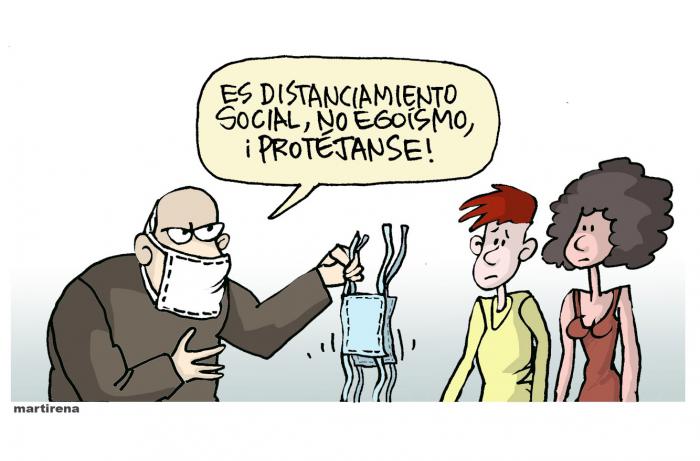
Photo: Martirena
This coronavirus that goes around the world, brings us some lessons and challenges. There are ancient truths that sometimes remain hidden in the agility of the days. These are some of them: sickness can knock at the door of the prince or the beggar; man’s life is fragile, and we all have, as an increasingly connected species, a common destiny. That, in a way, reminds us of César Pavesse’s dramatic verse: “Death has a look for everyone”.
Overwhelming were the images of empty cities in the midst of quarantine. It seemed as if a flutist had taken away the inhabitants of a town, or that we were leaning out of a window that let us see clip from one those science fiction images in dystopian and apocalyptic societies.
There are countries where human health is just another commodity; where a test to determine whether someone is a carrier of the virus could cost $3,000. Is that true? And how do those who have no health insurance manage? COVID-19 lays bare the structural flaws of social systems, where people are the screws of the great machinery that produces millions of dollars for a few, and poverty for many.
Now the virus is also an examination of ethics; selfishness makes its trenches, lies and morbidity run through the social networks exacerbating panic and uncertainty, and solidarity is a bit of fire that survives the drizzle.
How beautiful was the scene of the Italians singing as a chorus from their balconies! It is as if they were contaminated by the virus of collective happiness, of laughter, or that mystery of love that cannot be defeated in the best of peole.
That’s why Evangelina, in Havana, took three of her sheets and turned them into nasobucos for anyone who needs them, no matter who is a stranger. And a ship, where there were people carrying the virus, was given permission, despite the risks, to enter a Cuban port for humanity, and then sent them all home by plane.
Perhaps for Cubans, the biggest problem has been how to avoid hugs, effusive greetings, that habit of affection that identifies us as much as an identity card. It’s just is that we are used to rolling over in a conga, even after that cyclone that blows us away; to throwing the domino on the table to sing a capicua; to dance casino or to argue about a ball in a corner.
Today we still need that distance that this terrible disease forced us into. In spite of the phases that put the country on the road to a new normality, it is still necessary to delay the overdose of affection; to continue the truce by talking to us so closely; to extend the rest to the squeezes of euphoria. We still need to greet each other with closed fists, with forearms, with that gesture, which is not ours, of bowing like someone going to a judo match, or retiring from the tatami.
Let’s give ourselves one more time. Everything has its time. We are winning, but let’s not be in a hurry to go back to the burden of divided hugs, to that mania of walking mixed up in the noise and the affections. Let responsibility and patience dominate our actions, so that the unwanted return of the virus, in the form of carelessness, does not destroy love, optimism or desire.
Let us keep an open book so that, later on, we can fill it with hands that squeeze, in this Island where joy lives on guard.
From Auditor to Temporary Police Officer

Young People in Front of COVID-19:
From Auditor to Temporary Police Officer
On the Isle of Youth, Young Communist League members were trained by the Ministry of the Interior to take voluntary responsibility for supporting control measures in shops where food, toilets and other products are sold
By Roberto Díaz Martorell
corresponsales@juventudrebelde.cu
April 14, 2020
Translated and edited by Walter Lippmann for CubaNews.
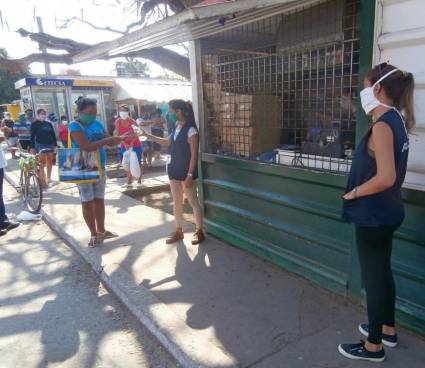
Indira Guevara and her colleagues control the distance at a point of sale in Nueva Gerona. Author: Roberto Díaz Martorell Published: 14/04/2020 | 10:49 am
NUEVO GERONA, Isle of Youth. – The COVID-19 not only changed the perception of the reality of the people who live in the world, but also transformed the work routines for many, such as the young Indira Guevara, auditor of the Municipal Comptroller’s Office, who today collaborates with the National Revolutionary Police to control the distance in the queues where food is sold.
There are 33 young militants of the Young Communist Union (UJC) who were trained by the Ministry of the Interior (Minint) to take on the voluntary responsibility of supporting control measures in commercial establishments where food, toilets and other products are sold.
“We were called together by those of us who do not have children or elderly people at home and we were assigned this task in the People’s Councils where we live, so that we do not move from one neighborhood to another and avoid the movement of people that could facilitate the spread of the virus.
“I was assigned to Abel Santamaría, a community that today reports six positive cases to COVID-19 and therefore extreme measures of quarantine and reinforced isolation are adopted, so I consider my work more important.
“They told us how we should proceed with the population to help avoid crowding in the queues, both in the stores in CUC and in the markets and points of sale of other food or supplies. Without hesitation, I accepted. This will allow the police to devote most of their personnel to areas with limited movement.
“We all agreed because the situation we are experiencing today is very complex and it is the duty of the young people to assume responsibility, as revolutionaries and Cuban citizens.
“It is true that sometimes we are afraid because it is something new and it is not a game: that pandemic has taken many lives in the world. Already here, on the Isle of Youth, one person has died, and many still do not understand the magnitude of the risks they take on the streets.
“At first it was funny, but it is true that the police vest they gave us gives us some authority, because when they see us so young people may think that we are not prepared and they may continue to be disobedient.
“So far I haven’t had any unpleasant encounters. We address people with respect and education so that they keep their distance from each other, so that they do not despair. We ask them please and that opens the dialogue to a better understanding.
“However, no matter how hard we try, they distance themselves and the next minute they are together again. People should be more aware of how dangerous this pandemic is and once and for all assume with responsibility and discipline the measures, which are all for the good of all,” reflected Indira Guevara.
This booster troop works on a voluntary basis from the time shops open until they close. Everyone is guaranteed water, a snack, lunch, and they rotate on occasions to rest. There is always a Minint officer with them, to advise and solve any situation that may arise.
According to Yander Zayas, first secretary of the Municipal Committee of the UJC in Isla de la Juventud, the group chosen comes from sectors such as Energy and Mines, Computers and Communications, Education, Sports or are students of the territory. This youth participation in the tasks of prevention against COVID-19 is part of the country’s strategy to guarantee the continuity of services to the population and ensure the future and health of all.
Banish Indiscipline, Mobilize Consciousness

Banish Indiscipline, Mobilize Consciousness
Putting indiscipline at bay is not only necessary, but imperative. Let us integrate that team called consciousness, which demands shame and good judgement.
By Madeleine Sautié | madeleine@granma.cu
August 3, 2020
Translated and edited by Walter Lippmann for CubaNews.
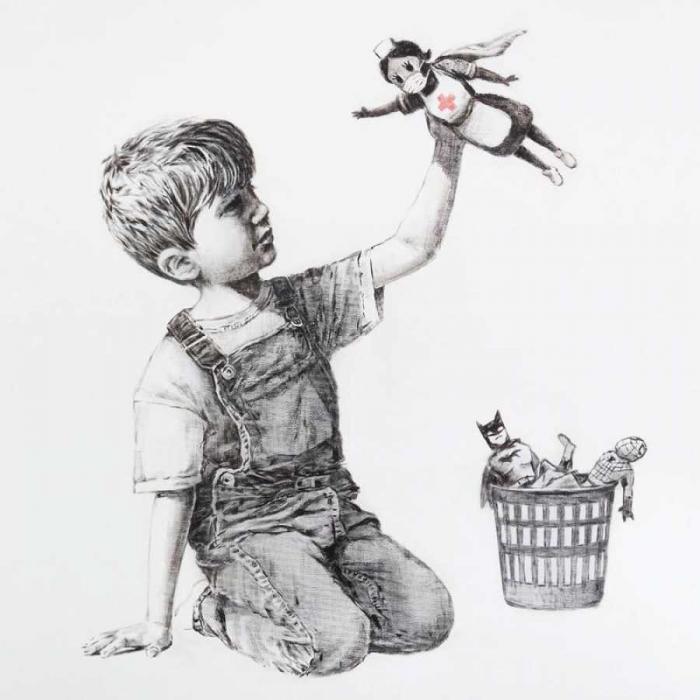
Image by Bansky
There was a day when Havana, still in the early stages of the pandemic’s de-escalation, awoke to the happy news that no new positive cases were being reported. Spirits, then, shot up, since the expected zero marked the result of a country’s enormous effort, say, among many workers, that of its doctors, in the first place.
Today, the faces are not the same, and concern is growing at the same time as the numbers and the courage to give so much. Unforgivable are the failures which, due to irresponsibility and disbelief, have modified the results we’ve achieved. Example: insolent disregard for a health system and the management of the Cuban state, applauded for the efficiency of its task, even by those who insist on seeing the erasures in an increasingly admirable health scenario.
Then comes the “must do”, the “have to take action”, as if banishing disobedience was only the business of a few. It is no secret that the legal provisions and police authorities have – as they have done from day one – a great weight in the fulfillment of the guidelines.
However, it is unthinkable that the solution lies only in the application of fines or in ensuring that the law enforcement officers are where every [act of] indiscipline is. It is enough to look out on the balcony, or to walk through our streets, to see, in a perfectly peaceful environment, where the police do not have to be, two or three people talking, one almost on top of the other, without nasobucos! -Will there really be a policeman for each of these cases?
There are two sides to this. On the first side, there are those who protect themselves and their family, compañeros and neighbors through good hygiene practices and distance, those who contribute to the dissipation of the virus; those who reverence with discipline the vigilance of the health personnel and value the happiness of living in Cuba, when the world suffers daily from overwhelming scenes.
The others, the ones who barely inform themselves, the irreverent ones who are aware of their own danger and that of the others; the ones who allow themselves to be spoken to from upstairs, and without nasobucos; the ones who know how to be attended to if the virus knocks on their door; the ones who are more bored than anyone else, who need to attend the party that another sorry person prepares.
Putting indiscipline at bay is not only necessary, but imperative. Let’s join that team called conscience, which calls for [both] shame and sanity.
Death Over the Factories of Death

Death Over the Death Factories
War industries, U.S. priorities for economic reopening in the midst of the COVID-19 pandemic, as Pentagon budget continues to rise madly.
 August 10, 2020
August 10, 2020
By Juana Carrasco Martín
juana@juventudrebelde.cu
Translated and edited by Walter Lippmann for CubaNews.
It could be the agricultural implement factories, but that is not the case. They should increase protective measures for workers in the meatpacking industries, for employees in supermarkets, or for agricultural workers, but that is not their intention either.
There isn’t even an equal standard for health-care workers, and Blacks and Latinos are infected with the new coronavirus three times more than their white counterparts, according to a New York Times analysis of the records of the Centers for Disease Control and Prevention (CDC).
The study also found that minority workers were 20 percent more likely than white workers to care for suspected or confirmed Covid-positive patients. The rate rose to 30 percent specifically for Black workers. In addition, they also reported inadequate or reused protective equipment (PPE) at a rate 50 percent higher than that reported by white workers. For Latinos, the rate was twice that of white workers.
Although the SARS-CoV-2 pandemic is not over, and, on the contrary, there is a resurgence of infections in those states that prematurely relaxed or lifted restrictions on social or physical distancing – to be more precise – those that set about economic movement brought, in not a few cases, a priority that projects good times for… the Pentagon and the war industry.
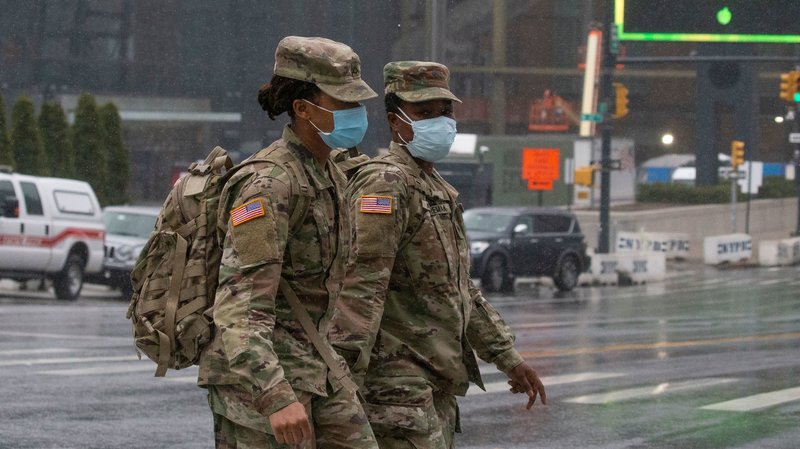
U.S. military personnel, seen outside the overflow hospital at the Javits Convention Center in Manhattan last month. The Pentagon has issued interim guidance advising caution pursuing recruits who have been hospitalized previously with COVID-19.
Nor is Eisenhower taken into account
The reality surpasses logic in the Trump administration. Making money continues to be the interest and not the care of people’s lives. That is why national security is being relieved, leaving aside a total battle against the enemy SARS-CoV-2 pandemic and continuing to bet on a war, or all the necessary ones, anywhere in the world against a supposed enemy that allows them to manufacture bombs and war equipment of all kinds.
When the numbers of infected and dead in the United States are terrifying -4,941,796 people infested, so probably this Sunday it will reach five million-, Congress has already discussed the Pentagon’s budget. We remember that independent Senator Bernie Sanders, published an opinion in The Guardian, in which he presented a true picture, a warning and a call:
“At this unprecedented moment in America’s history–a terrible pandemic, an economic crisis, people marching across the country to end systemic racism and police brutality, growing inequality of income and wealth, and an unstable president in the White House–now is the time to bring people together to fundamentally alter our national priorities and rethink the very fabric of American society.
The fact is that they approved $740 billion in spending and ignored Sanders’ proposal to cut 10 percent and target it to meet the needs of the most disadvantaged in the U.S. population, which would have been $74 billion for housing, education and health care, essentially. And the Vermont senator cited a Republican hero, General Dwight Eisenhower, who said in 1953 “Every gun that is made, every warship launched, every rocket fired means, in the final sense, a theft from those who are hungry and are not fed, those who are cold and are not clothed. This world in arms is not spending money alone. It is spending the sweat of its workers, the genius of its scientists, the hopes of its children.
The current situation is much more critical: a quarter of the U.S. population is living from paycheck to paycheck, and now from the pandemic subsidy check, which in July has not yet been approved by Congress; between 22 and 40 million fear eviction for not being able to pay the rent, 40 million also live in poverty, and 87 million lack adequate health insurance.
Sanders is not the only one busy with waste. California Democratic Representative Ro Khanna is proposing that money for the “modernization” of intercontinental ballistic missiles go to research on the anti-Covid vaccine. California Democratic Congresswoman Barbara Lee is calling for a $350 billion cut in the war budget.
Even Eisenhower could not change the military-industrial complex of which he warned, and even less do Sanders, Khanna and Lee, although they appeal to the emergency caused by the new coronavirus, when the President of the country, Donald Trump, daily minimizes the magnitude and lethality of the pandemic and only takes advantage of it to lead the situation in order to be re-elected next November.
Among his most recent manipulative expressions are assuring that children “are practically immune” to COVID-19, and almost assuring that they will have a life-saving vaccine by November 3 – election day – because he is pushing it with all his might, even though he says it is not to win at the polls, he wants to save lives?
Trump, who has long sought exclusivity on potential vaccines, announced in May that the huge task of delivering the vaccine will be in the hands of the military in conjunction with the CDC. At the time he said it would be at the end of the year, but the circumstances surrounding the election campaign, which are not in his favor, have led him to make the hasty declaration that in November he has the salvation of the world in his hands?
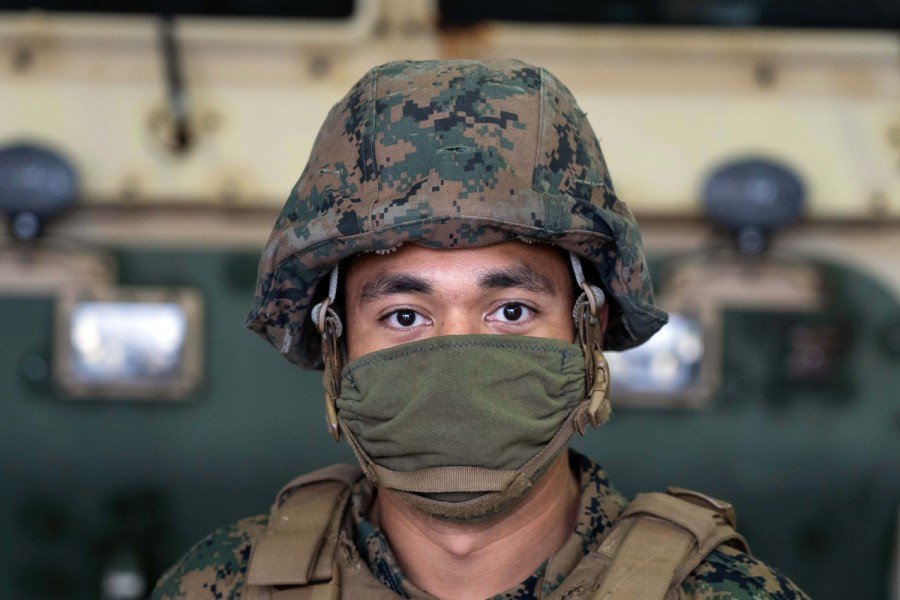
The military and COVID-19
There is a reality, in these dramatic times and when the number one enemy should be the pandemic. The Department of Defense is not accountable for its expenditures, while its contractors are making huge profits, as always, under the cover of a circumstance long highlighted by critics of the system. The main recipients of war industries’ contributions to their respective election campaigns are the members of the House and Senate Armed Services Committees.
To make matters worse, the new coronavirus has served to compensate arms manufacturers for alleged losses in profits as well. For example, General Electric, which has laid off 25 percent of its workforce, received $20 million to expand its development of “advanced manufacturing techniques,” and Spirit Aerosystems received $80 million to expand its domestic manufacturing after laying off 900 workers.
Some analysts warn that military expenditures could be reduced if the billions spent on the new Cold War with China were not available; if the Pentagon’s requests to buy the controversial and clearly imperfect F-35 fighter planes from Lockheed Martin were not met; or on Trump’s new warrior invention, the Space Force.
Included in the waste is General Dynamics Electric Boat’s $126 billion nuclear submarine program, the new Ford class aircraft carrier built by Huntington Ingalls for $13.2 billion, and its launch system that remains unlaunched but earns a profit for General Atomics. By the way, Bloomberg reported that the ship’s toilets are frequently clogged and can only be cleaned with specialized acids that cost about $400,000 per flush…).
The clogging is greater in those Pentagon priorities, when it becomes known from a June article in Tom Distpach, that in February 2018, the Government Accountability Office, which to some extent oversees federal spending, warned that the Defense Department’s health care system lacked the capacity to handle routine needs, let alone wartime emergencies, and within the ever-increasing military budget, military health care has grown next to nothing.
The 41,361 individuals linked to the Department of Defense, both military and civilian employees, infected with COVID-19, and in a staff mostly in the 18-24 age range we have not found the recognized number of deaths, will they be the humane and disposable part of that budget “oversight”?
Our Women

Our Women
In keeping with these times, more than 130,000 women have joined the urban agriculture movement and the medical brigades that have gone out to fight the pandemic in other nations, 61% of whom are women.
By Yenia Silva Correa
August 5, 2020
Translated and edited by Walter Lippmann for CubaNews.
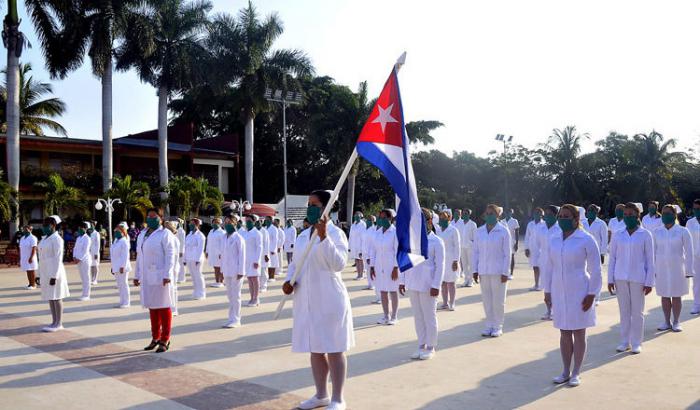
Photo: Rodríguez Robleda, José Raúl
From economic and productive work, continuation of the work to support the fight against the pandemic and stops to pay homage and recognition, the Federation of Cuban Women (FMC) is promoting a group of activities to commemorate the 60th anniversary of the organization, which will take place on August 23.
With strict adherence to the health measures required by the complex epidemiological situation caused by COVID-19, it was reported this Tuesday, through a press conference, that the program on the occasion of the event will have the communities as its setting.
Teresa Amarelle Boué, Secretary General of the organization and member of the Political Bureau, reminded [everyone] that the main challenge that the new coronavirus represents today does not diminish the protagonist [leading role, wl] of Cuban women in the other challenges they lead. These include “maintaining what has been conquered in terms of gender equality, that there are no setbacks in the midst of the new forms of economic management that the country is promoting, the situation of the aging population and how to perfect the protocols of action to confront gender violence in our country.”
JOY AT NATIONAL HEADQUARTERS
Excited, after the news of being the vanguard of the country, the FMC of Santiago de Cuba dedicated to the FMC’s founder, Vilma Espín, the condition received.
“We could not go to Segundo Frente, to pay her any other tribute than this one, obtained in the midst of the current complexity”, declared Elena Castillo Rodríguez, provincial secretary.
In addition to the leading role played on the health front, she highlighted the massive incorporation of food production in agriculture and on industrial estates, the demand for discipline in public spaces, the active promotion of electricity saving, and the implementation of more than a hundred training programs for women who are not working.
Cuba and The New “Abnormality”

Cuba and The New “Abnormality”
 By Ricardo Ronquillo Bello
By Ricardo Ronquillo Bello
ronquillo@juventudrebelde.cu
June 20, 2020
Translated and edited by Walter Lippmann for CubaNews.
It’s not normal, it’s not normal, it’s not normal… I was repeating as in the chorus of an endless serenade by a well-known Cuban politician several months ago. He was doing it when the coronavirus still seemed no more than a disturbing little strain licking itself with its appearance in a market in faraway Wuhan and its unexpected and mournful Bib bang was not spreading it at lightning speed across the four corners of the planet.
Normality versus abnormality, here is a question, we could define a peculiar Cuban Shakespearean drama, which feeds on strains, some as strange and imposed on us as the very COVID-19, and others very much made in Cuba, made in Cuban socialism, as much as they make us proud in some cases, or beat us Theophilus-like on the chin of our welfare in others.
Because of the above, while a good part of the world is heading towards the renamed “new normality” – despite the fact that the daily death of thousands of people and other misadjustments, which some romantically believe will be corrected by the arts of the coronavirus, discredit or unmask it – in Cuba we should better assume that the country, with its first phase of de-escalation, is advancing towards its new “abnormality”, yes, as you read it, abnormality.
In this regard, the aforementioned Cuban politician can be justified not “in part”, as the vocabulary of the Creole bureaucracy is accustomed to saying, but in all his parts, which he repeats, repeats and repeats, and it is not a “rattle” of any kind, that much of what we live, enjoy or suffer in this archipelago is definitely not normal, although some people might like to believe it or even make us believe it for sometimes very devious purposes.
Let’s take an example, of those that were heard in passing and unfortunately without any major media outbreaks, in the fight against the coronavirus: in Cuban prisons there were no cases of the virus detected and, consequently, no deaths. Compare this with what happened or what is still happening in other places, or with humiliating snapshots of prisoners in the region that have shaken the world’s conscience.
The same could be said of the gesture made by the Cuban Government and people – quite silenced, by the way, even by the powerful international media of the most benefited country – to the MS Braemar cruise ship passengers. A later report by Ignacio Ramonet would highlight Cuba’s rare horizon in the tragic fate of many of those strollers adrift in the ocean of selfishness and lack of solidarity framed by COVID-19.
It is not normal in this pandemic world -it was not so before and, despite all the good omens, it will surely not be so common in the future- that the human being comes first, that definition contained in all the documents that give shape to the aspirations of Cuban socialism in the 21st century and that, due to repetitions and hackneyedness, sometimes become pedestrian slogans.
It is worthwhile “baldly” to compare those two previous pearls with the Malthusian reason that spread throughout the world at the same rate as the coronavirus to try to defend that the economy – it would be better to say the capital of the powerful – should be above the value of any life.
From the philosophy of disposable beings did not escape even prominent nobles, from whom at least a rationality as high as their humanism would be expected. However, some calmly justify, without any charge of conscience, that throughout Europe the number of deaths from COVID-19 is similar to that which occurs in a very strong flu season. Something like that is pure waste to form so much international fuss for what is nothing more than a common cold.
It is also very suggestive that the proposals that the highest Cuban authorities are offering to their announced de-escalation – already in the first phase in most of the national territory – point more towards a new “abnormality”, than a return to the previous normality, which would be like continuing to carry old atrophys and vices. We had already made progress in the midst of the virus.
This is out of tune with the dismissive way in which it seems that the lessons of the coronavirus will be assumed worldwide, from which an infinite number of currents and conceptions could be armed, from the most reactionary to those that claim to humanize capitalism or warn of reconfiguring the role of states and public and private actors.
The new “normality” here would be to return to that situation, for moments of levitating resistance, in the face of the U.S. blockade, without really aiming -with forcefulness and rigor- at a program of national development that, although it does not prevent the criminals and growing branches, definitely overcomes them more successfully than in the past. It would be to continue to rely on boats to fill the plates and as many thirsty tanks.
The new normality would be to settle for the scandalous resilience of old knots, which tie us to worn-out and repetitive ways of overcoming serious structural problems. It would be to continue feeding the criminal chains as opposed to the legal and necessary chains between the public and private sectors of the country. It would be to ignore the modern rules of communication -based on closeness and transparency- in order to continue clouding them with prejudice and instrumentality. It would be, it would be, it would be…
And nothing that was announced in the country for the post-COVID-19 escalation resembles the above, because it would be to resort to the old and worn-out normality, when what we need is to rush, overwhelmingly, towards a revolutionary abnormality.
But,” the politician would say, “it would be blissfully normal, right, normal…, although it does speed up a little, as Formell would say.
US Betting on Reality Not Falsehoods

US Betting on Reality and not Trump’s Falsehoods
As new cases of the disease reach 60,000 a day across the country, many leaders, including those who supported Trump’s aggressive approach, now have no choice but to prioritize science over policy, leaving the president out of touch with reality
July 14, 2020
By Juventud Rebelde
digital@juventudrebelde.cu
Translated and edited by Walter Lippmann for CubaNews.
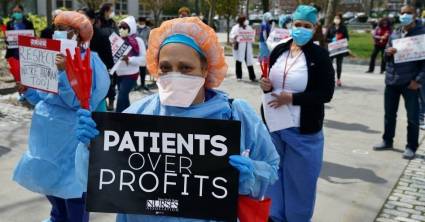
New cases of the disease reach 60,000 a day nationwide Author: Getty Images Posted: 07/14/2020 | 02:15 pm
While President Donald Trump is obsessing over his reelection hopes in his White House bubble, state and local leaders are frantically reversing the state reopenings he demanded, making the United States the largest access point for the coronavirus in the world, says a CNN analysis.
As emergency rooms filled up and the virus accelerated its relentless march through southern and western states, Trump clung to the fiction that the worst is over: “We had to close it; now we’re opening it,” President Trump said of the economy, patting himself on the back for saving “millions of lives.
As new cases of the disease reach 60,000 a day across the country, many leaders, including those who supported Trump’s aggressive approach, now have no choice but to prioritize science over policy, leaving the president out of touch with reality.
In Texas, Houston Democratic Mayor Sylvester Turner proposed a two-week shutdown, days after Republican Governor Greg Abbott raised the possibility of tougher measures after issuing a mandate to wear the mask that offended conservative orthodoxy. West Virginia called for the closure of bars in the hardest-hit county.
In California, Democratic Governor Gavin Newsom ordered the closure of all restaurants, grocery stores, movie theaters, zoos, museums and all bars. Los Angeles and San Diego said their children would start the new school year online only. Oregon banned gatherings of more than ten people inside due to an “alarming increase” of cases in the state.
KFC encouraged franchises in Florida, Texas, Oklahoma and California to stop serving. Florida on Saturday set a record for any state in one-day data on new infections, and COVID-19 cases continue to rise.
The picture is one of a nation that is beginning to close again in defiance of the President’s triumphant but misleading claims that he is leading a “transition to greatness,” the analysis released by CNN says.
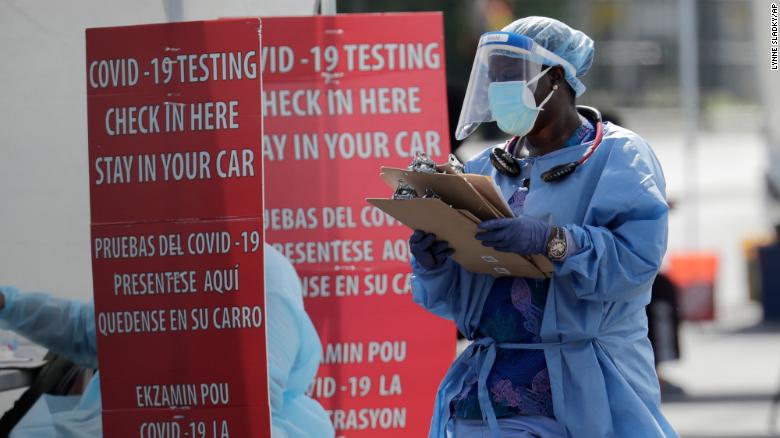
A health care worker carries a stack of clipboards at a COVID-19 testing site sponsored by Community Heath of South Florida at the Martin Luther King, Jr. Clinica Campesina Health Center, during the coronavirus pandemic, Monday, July 6, 2020, in Homestead, Fla. (AP Photo/Lynne Sladky)
The restrictions imposed on cities as large as Houston and Los Angeles could reverse the surprising economic revival of last month. The modest employment gains, trumpeted by the President, could turn into permanent job losses.
In comments that are likely to infuriate Trump even more, Dr. Anthony Fauci, director of the National Institute of Allergy and Infectious Diseases, made what is, unfortunately, becoming an obvious point: the rapid openings have triggered a disaster.
“It’s very clear — and we know from countries around the world — that if you physically separate people to the point where you don’t allow the virus to spread … we know we can do it if we close,” Fauci said at a Stanford Medical School webinar.
“We don’t close down completely – and that’s why, when we went up, we started going down, and then we stagnated at a level that was really quite high – about 20,000 infections a day,” Fauci said. “So, when we started to reopen, we’re seeing today’s waves, as we speak, in California … in Arizona, in Texas, in Florida, and in several states.
There are some bright spots. For the first time in months, there were no COVID-19 deaths in New York City in a 24-hour period, a moment of liberation that Democratic Mayor Bill de Blasio called “knock and move.
Massachusetts announced that its seven-day average of positive tests had fallen to 1.7 percent — 94 percent less since mid-April. The lesson for states now at the center of the storm — which predated the U.S. Centers for Disease Control and Prevention’s guidelines on safe reopening — is sobering.
New York and Massachusetts bought what may still be only a temporary truce with the coronavirus for weeks of closures and a strict reopening process that waited for the infection curve to be properly suppressed before restrictions were lifted. Even now, there is no guarantee that the virus will not return to dangerous levels when normal life returns.
However, El Nuevo Herald reports that Florida reported 9,194 new confirmed cases of coronavirus on Tuesday and 132 deaths in 24 hours, the highest number of deaths from the disease recorded in the state since the start of the pandemic in March, according to the Florida Department of Health.
The state set a national record on Sunday with 15,300 infections on the day, but Republican Gov. Ron DeSantis of Florida is insisting on a reopening.
The pandemonium virus

The pandemonium virus
Our greatest threat is not pandemic, but “pandemonium”. Among the meanings that appear in the Grande Dicionário Houaiss of Portuguese is the following: pandemonium is an “association of people to practice evil or to promote disorder and confusion”
Author: Frei Betto | internet@granma.cu
July 15, 2020 00:07:24
Translated and edited by Walter Lippmann for CubaNews.

Aerial view of tombs in el cementerio Nossa Senhora Aparecida, in Manaos, Brazil. Photo: AFP
The Brazilian news program prioritizes the advance of the pandemic and the ineffectiveness of the federal, state and municipal governments. Allegations of corruption, such as the purchase of overcharged respirators and misappropriation of public funds, follow one another. What each of us fears most, even those who for reasons of survival are forced to disregard confinement, is contracting the virus in a lethal way.
Is it true that our greatest threat of genocide is COVID-19?
I don’t think so. Our greatest threat is not pandemic, but “pandemonium”. Among the meanings that appear in the Grande Dicionário Houaiss of Portuguese is the following: pandemonium is an “association of people to practice evil or promote disorder and confusion”.
The main evil that threatens the Brazilian nation today is the government of Bolsonaro, who suffers from thanatomania, an obsession with death. A person suffering from phallic obsession embodied in weapons, who defends torture and exalts torturers and paramilitaries, certainly does not feel the slightest concern for the growing number of victims of the pandemic, whether 60 000 or 600 000, because she is psychologically blocked from warning the other. He only manages to see himself and the extent of himself, as his children.
It is the syndrome of depersonalization, a disorder that leads to insensitivity and makes feelings just work in the head, that is, one reasons about them without managing to experience them.
A person who likes to shoot so much and brags about his good aim doesn’t have to care about a wave of lethality, as long as he doesn’t get it. Since he cannot follow through on his manifest desire to “kill 30,000”, as he has said, he is pleased to see the number of dead multiplied daily by the COVID-19.
His only concern is that the pandemic will seriously affect the economy and, consequently, his chances of re-election, which psychologically can be understood as perpetuation. He acts as if he were invulnerable. He escaped an alleged stabbing attack, so it will not be a “crack” that will bring him down. That is why he does not respect confinement or social isolation, goes out on the streets without a mask, does not avoid crowds and does not care about personal detachment.
It is this sense of impunity and immunity that must have crossed Nero’s mind when he saw Rome devoured by fire. Hugging his lyre, he was convinced that the fire would not reach his palace.
More serious than the virus is this government negligence. Because, in addition to thousands of deaths from the pandemic, it produces victims of the economy: the 13 million unemployed and the 120 million Brazilians, of the 150 million over 16 years of age who earn less than two minimum wages a month. That’s not counting those who will be affected by the recession caused by COVID-19.
The “pandemonium” virus spreads the specter of symbolic death, by giving free rein to police violence and the arms trade; undermining culture and respect for human rights; weakening education; and encouraging deforestation and the invasion of indigenous lands.
This “pandemonium” virus, which lives in the Alvorada Palace and has been carrying out its lethal work since the Planalto, is the most serious threat to democracy and the Brazilian nation.
Subscribe to Blog via Email
| M | T | W | T | F | S | S |
|---|---|---|---|---|---|---|
| 1 | 2 | 3 | 4 | 5 | 6 | 7 |
| 8 | 9 | 10 | 11 | 12 | 13 | 14 |
| 15 | 16 | 17 | 18 | 19 | 20 | 21 |
| 22 | 23 | 24 | 25 | 26 | 27 | 28 |
| 29 | 30 | |||||



You must be logged in to post a comment.